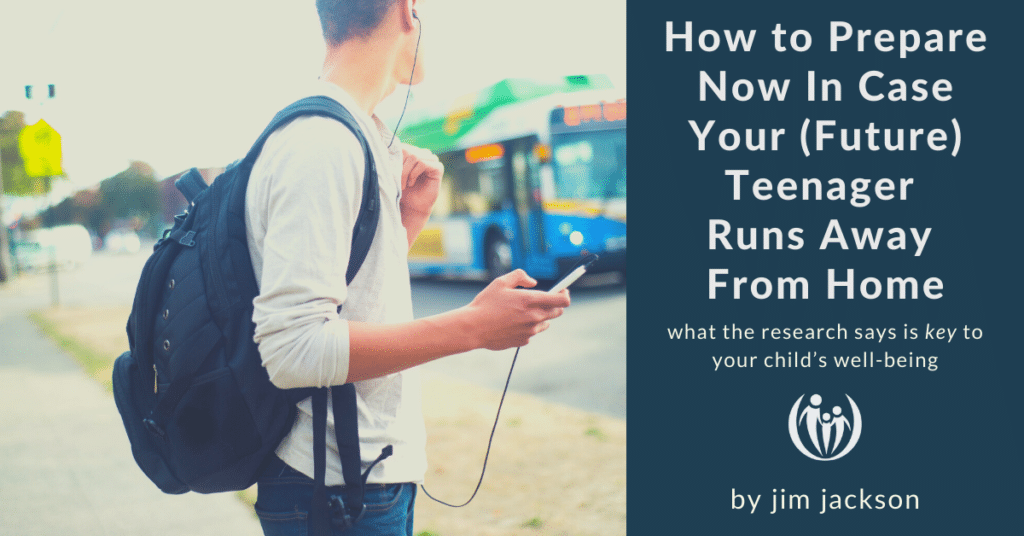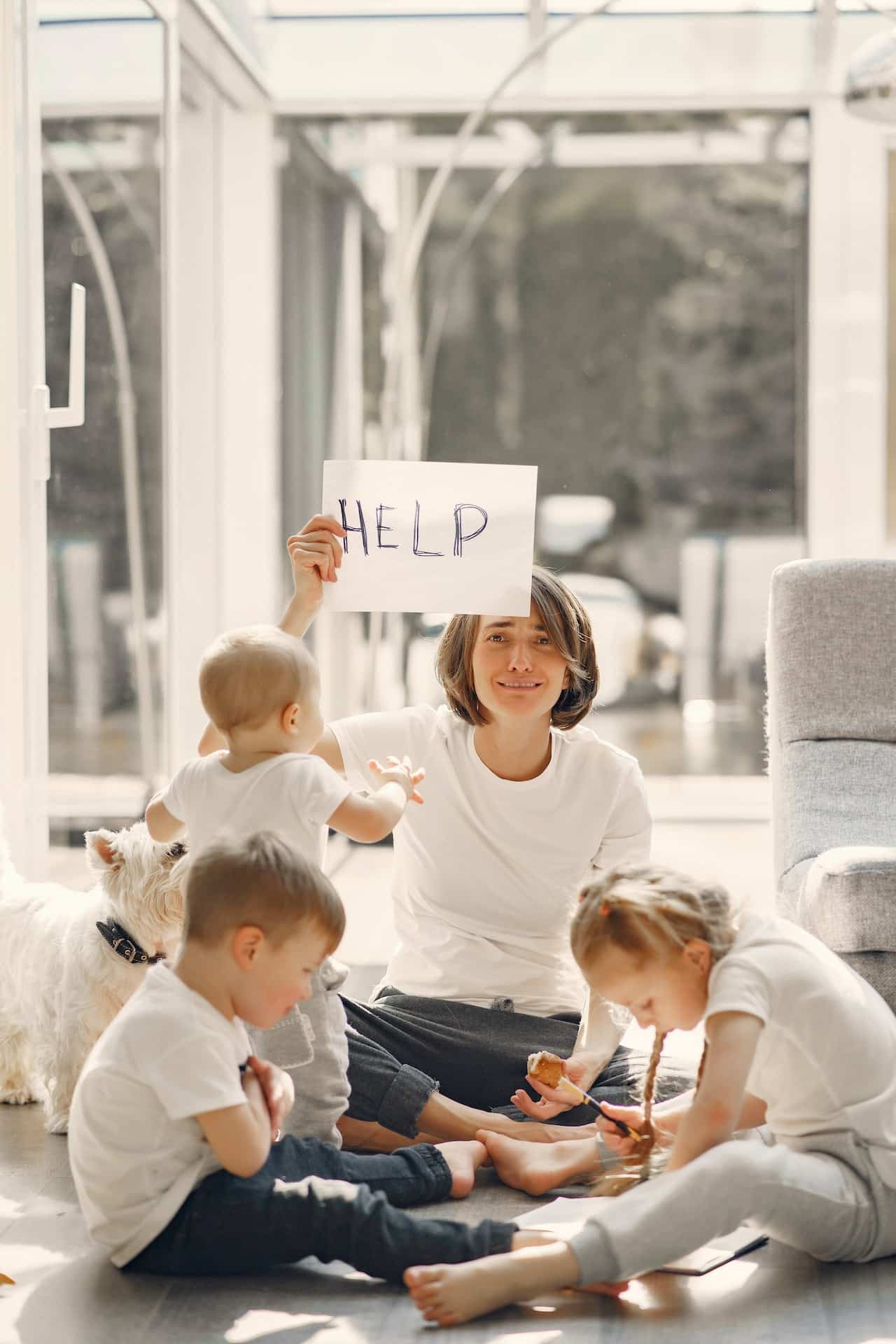
How to Prepare Now In Case Your (Future) Teenager Runs Away From Home

Let’s imagine: What if your teenager runs away from home? Picture the moment you find out. You badly want to freak out. Where would they go? What if they get injured? What if you could go into that moment confident your child would still be okay? You don’t want your child to run away ever, but hormones, a still-developing brain, and anger and frustration can lead to all sorts of decisions. The goal is to prevent lifelong regrets.
When my teenage son ran away from home
I (Jim) vividly remember the cold, rainy night our 15-year-old son left a note saying: “I’m too mad to be at home. I’ve left. Don’t come looking for me because you won’t find me. Don’t worry, I’ll be safe.”
I did what any panicked, desperate parent would do. I disobeyed my son. I worried madly, ignored the note, called close friends, and went looking for my runaway son. I imagined every worst-case scenario. My child could freeze to death in the rain. He could be abducted. It’s incredible how quickly our fear grips us when we feel our loved ones could be in danger.
As my mind whirled a million miles a minute, I stopped, prayed, and brought my concerns to the Lord. As I considered which of my child’s friends he might turn to, my mind slowed. I realized that if indeed our child landed in the home of any friend, we would have no worries. We were comfortable with all his friends, knew their parents, and knew he would be safe.
As I reviewed the list of possible places he would go, my intense fear gave way to a glimmer of comfort and hope. The only viable options for our child were the kind of people who would care for our son, provide a safe harbor, and reinforce the values we hold so dear.
We intentionally formed this community long before our child might run away
When parenting gets overwhelming — and it’s bound to get overwhelming at times — there can be great comfort in the safety net of a supportive community. This can be especially encouraging when you know others will affirm and reinforce transforming love and guidance for your children. Because Lynne and I knew the research about this, we were intentional about cultivating intergenerational relationships for our kids. We made sure the people our kids most loved and trusted outside our family were people we loved and trusted, too.
This got me thinking about the day Jesus’ parents accidentally left him at the temple when he was twelve years old (Luke 2:41). How could this happen? It says, “After the festival was over, while his parents were returning home, the boy Jesus stayed behind in Jerusalem, but they were unaware of it. Thinking he was in their company, they traveled on for a day.”
How could they be unaware that Jesus had stayed behind? Were they bad parents? I don’t think so. In fact, they were probably great parents, which in that day involved making sure your child was well known and cared for by your closest community. When Joseph and Mary figured Jesus “was in their company” (their community), they didn’t worry for a whole day!
I felt like Joseph that night, realizing our son Daniel must be with someone we know!
Who is in your family’s community?
The story of Mary, Joseph, and Jesus raises the question: Who fills the role of community for your children?
The Bible tells us to encourage one another, care for one another, and bear one another’s burdens. Might an overlooked application of “one-another” verses be about caring for each others’ children?
We are privileged to share our home with a small family that’s been through some challenges, and the mom has been very intentional in building community for her children. Watching how their extended family connects is inspiring – the aunts and uncles are very involved with each other’s kids. They regularly help each other with transportation, sleepovers, group birthday parties, and sometimes bringing the kids to attend a cousin’s sporting event. All this builds a safety net and a strong sense of community, identity, and accountability for the children.
Wendy, one of the single moms in these CF podcasts (“Being a Single Mom is Exhausting | Ep. 62” and “What’s the Best Way to Handle Shared Parenting | Ep. 63”), shared with Lynne how essential other families were when her family first went through a traumatic divorce. They provided a sense of stability, safety, and care during a tough time. Her brother, in particular, came alongside their family. Wendy nurtured the family’s relationship with her brother and his two sons, who were respectful older cousins and role models to her kids.
When Wendy’s sensitive, emotional oldest struggled with intense sibling conflict, she suggested that he ask his uncle to share what he learned when he was young about being a big brother. They had a great conversation about it. The example of her brother and these older cousins was vital to transforming sibling relationships in their family toward peace and caring.
Build a “village” that will care for your children, including a runaway child
If you only had weeks to live, you’d likely do everything possible to enlist this supportive community for your children. A community that would care for them and ultimately carry out your hopes and dreams for pointing them to Jesus. In doing so, as the Bible says, you’d invite those people to bear your burdens. And with good reason. It turns out that the more supportive relationships a child has, the better that child will do in life.
If “it takes a village” to raise your children, who is in your “village”? How could you be more intentional about surrounding your family and your children with a community of people who are safe and supportive? Here are some practical ideas from those in the Connected Families community:
It may work best to start from the pool of families with kids your children already know and enjoy. Then, nurture relationships with those families who will reinforce your values. (Outreach to families with different values is also important, but probably not a source of supportive community.)
- Set up carpools with other families, and don’t drive to Every. Single. Sporting event! (This has the added benefit that kids recognize a sport is their thing, not just for their parents’ vicarious life. And they get to report to you afterward how it went.)
- Invite families to join you as you serve or serve on a team with other families at church. (We did service trips and activities with other families when our kids were young that were meaningful and bonding.)
- Do a staycation with another family where you set aside a week and plan lots of fun activities. (See our mudsliding picture in this article!)
- Develop regular traditions with another family. (For years, we did the 4th of July with one family and Labor Day camping with another.)

- If you have generous grandparents, see if they will sponsor cousin events for Christmas or birthdays. Or if cousins aren’t available, you can give coupons for fun activities with another family as gifts.
- Consider hosting monthly Friday night potluck dinners with no sign-ups for what dish you bring, just relaxed hang-out time. Adults can talk, and kids and teens play games.
- Join a Bible study that includes kids.
- Host an outdoor movie night.
- Be active with your homeschool co-op or the families from your kids’ extracurricular activities.
- Prayerfully consider people and activities that could strengthen your family’s connection with others – God loves the fellowship of his children and will give you wisdom and insights as you ask him.
You can make forming a safe, connected community part of the fabric of your family today as you strengthen the godly influences in your children’s lives! Even if your child is already struggling, it’s never too late to strengthen the community surrounding your family.

Know your strengths.
Your best mom or dad instincts are exactly what your kids need. So identify them. Take the free Parenting Strengths Assessment.

